2017届高考英语北师大版一轮复习教案:必修1 Unit 1 Lifestyles 含解析
- 格式:doc
- 大小:772.00 KB
- 文档页数:18
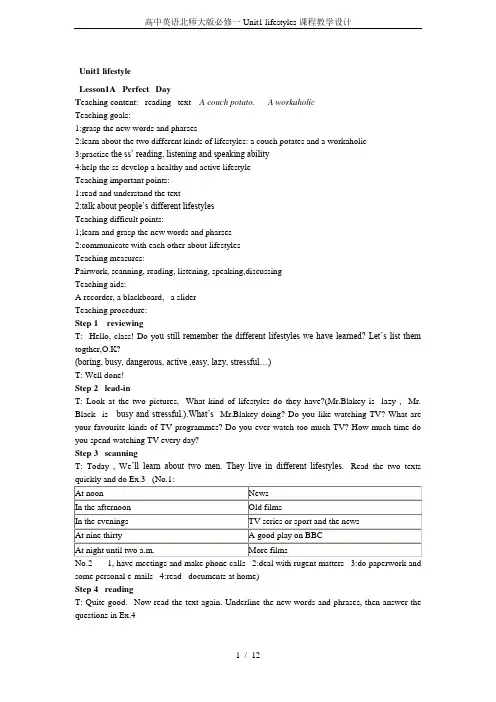
Unit1 lifestyleLesson1A Perfect DayT eaching content: reading text A couch potato. A workaholicTeaching goals:1:grasp the new words and pharses2:learn about the two different kinds of lifestyles: a couch potates and a workaholic3:practise the ss’ reading, listening and speaking ability4:help the ss develop a healthy and active lifestyleTeaching important points:1:read and understand the text2:talk about people’s different lifestylesTeaching difficult points:1;learn and grasp the new words and pharses2:communicate with each other about lifestylesTeaching measures:Pairwork, scanning, reading, listening, speaking,discussingTeaching aids:A recorder, a blackboard, a sliderTeaching procedure:Step 1 reviewingT: Hello, class! Do yo u still remember the different lifestyles we have learned? Let’s list them togther,O.K?(boring, busy, dangerous, active ,easy, lazy, stressful…)T: Well done!Step 2 lead-inT: Look at the two pictures, What kind of lifestyles do they have?(Mr.Blakey is lazy , Mr. Black is busy and stressful.).What’s Mr.Blakey doing? Do you like watching TV? What are your favourite kinds of TV programmes? Do you ever watch too much TV? How much time do you spend watching TV every day?Step 3 scanningT: Today , We’ll learn about two men. They live in different lifestyles.Read the two textsNo.2 1, have meetings and make phone calls 2:deal with rugent matters 3:do paperwork and some personal e-mails 4:read documents at home)Step 4 readingT: Quite good. Now read the text again. Underline the new words and phrases, then answer the questions in Ex.4(Suggested answers: No.1: Brian do nothing but watch TV for 16-17hours and his wife makes money and prepares meals for him. No2: You know everything happening in the world and feel powerful and successful)Step 5 language learning1: switch on : turn onSwitch the TV on quickly, the game will be on TV soon2: switch off: turn offBefore leaving, you should switch the tap off.3:switch over: change the channels from one to another.The programme OUTLOOK is on TV. Let’s switch it over to Chaanel 9.4:be filled with; be full of5:take up: cover,occupy Playing football takes up most of his time6:get changed; change one’s clothes7:make one’s way through:do sth.. from the beginning to the endI have been sitting , making my way through my lesson for hoursT: Let’s do Ex.7complete the sentence below in the correct form . After that we’ll play the tape for you to listen and then I’ll get some ss to read the text alou d.Step 6: consolidationT: We’ve learned Mr. Blakey and Mr. Black’s routine work. Do you think if their lifestyles are healthy? What can they do to improve their lifestyles? Discuss and then share your opinions with class.(For Brain he should spend less time on TV. First , he should get up soon after waking up and do morning exercises. Second ,he should try to find a job and go to work every day.. For Bob , he should sleep later every morning. He should eat a big breakfast and be more relaxed. He should also sleep earlier every night, and spend more time with his family. )T: Well, let’s go on to another topic . Ask your partner what he or she do at different time in a day, and decide wheather your partner is a couch potato or a workaholic? Use the following samples: What do you do at …?Step 7 homework1:Review new words and phrases2:Do the Ex. 10 describe your parents’ lifestyles to your partner by working in pairs Blackboard DesignLesson 1 A Perfect Day?1: switch on : turn on 2: switch off: turn off3:switch over: change the channels from one to another.4:be filled with; be full of 5:take up: cover,occupy6:get changed; change one’s clothes7:make one’s way through: do sth.. from the beginning to the endLesson 2 RelaxingTeaching aims:To practise listening for specific informationTo learn about ways of dealing with stress in everyday lifeTeaching course:Ⅰ Warm upWork is very important in our life. We have to work, no matter what you are. With the development of modern society, people are fastening their steps of life. There is less time for relaxation. The problem is that more and more people feel stressed. How to get rid of the stress we are suffering from is what we are to talk about.Ⅱ TalkingTask oneYou are to do some listening, Before it think about your school life, list the things ( at least 3 ) you do and your feeling about them.How do you get rid of the stress in your life?Talk to each other about the activities you have listed. Say which is stressful and which is relaxing. Do it like this:prepare for an exam; lie on the beach; wait for the result of; give a talk in English; do shopping with task two.Interview your classmates to see what kind of stress they are suffering from and how they relax themselves or get rid of it.ⅢListeningDo the exercise 2Do the exercise 3Read through the Strategies with the class and see if they can use any of these Strategies already. In pairs, students read the questions and try to predict the answers. Point out that morethan one answer is possible.Students then exchange ideas to find out if they have made the same predictions if they have made different predictions, ask students to justify their opinions.Do the exercise 5 and 6Before listening the materials ask students to read the questions and first predict answers then listen the tape twice.When students have checked their answers, ask them what advice they would give to Mark to help him be less nervous before exams and before going to parties.Do the exercise 7Students look at the exercise and see if they can remember or can guess any of the missing words. Students listen to the cassette again and complete the sentences in the Function File. PronunciationDo the exercise 9In our oral language we often pause. Now listen to Mark again. Which words or sounds does he use to hesitate?Students listen to the cassette. After each sentence, pause the cassette so that students can repeat the hesitation device.Do the exercise 10Before starting their talk, students can look at the sentences they wrote in Exercise 9Students then put the exercise away and talk to their group without any notes, using as many hesitation words as possible.Ⅳ Homework:Writ a report about you interview in class. Write about the stress you and most of your classmates are suffering from. Find the causes of the stresses and give advice on how to relax yourselves.Lesson 3 A Volunteer TeacherTeaching aims:To listen for specific factsTo give opinion about voluntary workTo talk about future arrangements and intentions, using the Present Simple, the Present Continuous and going toTeaching difficulties:To talk about future arrangements and intentions, using the Present Simple, the Present Continuous and going toTeaching Aids: computer and cassetteTeaching procedures:Ⅰ. SpeakingT: What does the girl do?S:T: Yes she is a volunteer teacher. T his is a real story. The girl’s name is Wang Shu, grew up in Hangzhou, Zhejiang Province. Upon graduation from the English department of Beijing Normal University, she left Beijing for Inner Mongolia working as a volunteer teacher. She is still there now. What do you know about this part of China?S:T: show a slide to introduce Inner Mongolia (Inner Mongolia (Nei Mongol) is the first national autonomous region established in China. It stretches along China's northern border with Mongolia and Russia and covers an oblong area of over 1.28 million square kilometers, one eighth of China. Of all the Chinese provinces and autonomous regions, Inner Mongolia is the third largest after Xinjiang and Tibet.) Inner Mongolia falls behind developed areas so it needs volunteers go to work there.T: What can you say about the girl in the photo?S:Ⅱ ListeningStudents read the questions and predict the answersT: I think you must be interested in Wang Shu, now listen to the interview, you will learn more about her and answer these questions.Students listen to the tape and check their predictions.Students listen to the tape again and make sure of the answersStudents work in pairs and take turns to retell Wang Shu’s storyⅢ Voice your opinionIs it a good idea to do voluntary work? What reasons do people have for doing voluntary work?Ⅳ VocabularyDo the exercise 5.Students work individually, thinking about the cues and what they are going to do.Students read the sentences, decide which words to use, and then complete the sentences. Translate sentences1.我们要两点半出发。
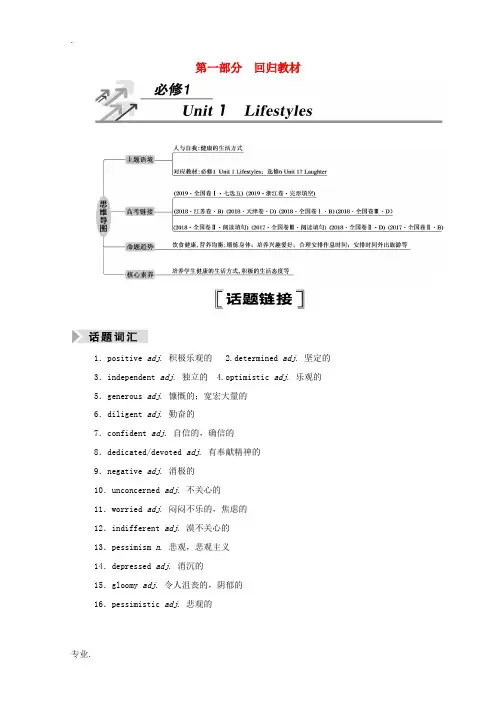
第一部分回归教材1.positive adj. 积极乐观的 2.determined adj. 坚定的3.independent adj. 独立的 4.optimistic adj. 乐观的5.generous adj. 慷慨的;宽宏大量的6.diligent adj. 勤奋的7.confident adj. 自信的,确信的8.dedicated/devoted adj. 有奉献精神的9.negative adj. 消极的10.unconcerned adj. 不关心的11.worried adj. 闷闷不乐的,焦虑的12.indifferent adj. 漠不关心的13.pessimism n. 悲观,悲观主义14.depressed adj. 消沉的15.gloomy adj. 令人沮丧的,阴郁的16.pessimistic adj. 悲观的1.feel the need to do sth. 觉得有必要(做某事)2.receive many awards for 因为……获得很多奖3.live as rich and full a life as others do 像其他人一样过着丰富多彩的生活4.overcome difficulties 克服困难5.call on sb. to do sth. 号召……做……6.a sense of responsibility 责任感7.take up 从事;拿起8.widen one's horizons 开阔某人的眼界9.win the prize 获奖10.the key to success 成功的关键1.Second, going outdoors and playing team games with your friends as physical exercise is an effective way to get rid of anger.第二,到户外和朋友一起进行团队型体育锻炼是一种有效的排解生气的方式。
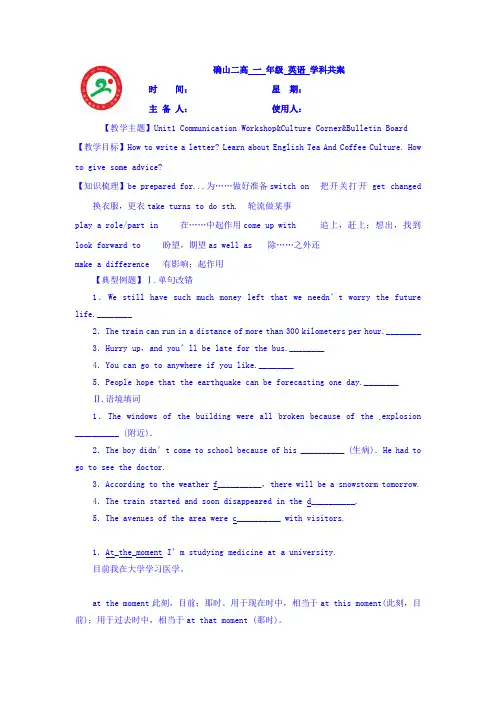
确山二高一年级英语学科共案时间:星期:主备人:使用人:【教学主题】Unit1 Communication Workshop&Culture Corner&Bulletin Board 【教学目标】How to write a letter? Learn about English Tea And Coffee Culture. How to give some advice?【知识梳理】be prepared for...为……做好准备switch on 把开关打开get changed 换衣服,更衣take turns to do sth. 轮流做某事play a role/part in 在……中起作用come up with 追上,赶上;想出,找到look forward to 盼望,期望as well as 除……之外还make a difference 有影响;起作用【典型例题】Ⅰ.单句改错1.We still have such much money le ft that we needn’t worry the future life.________2.The train can run in a distance of more than 300 kilometers per hour.________ 3.Hurry up,and you’ll be late for the bus.________4.You can go to anywhere if you like.________5.People hope that the earthquake can be forecasting one day.________Ⅱ.语境填词1.The windows of the building were all broken because of the explosion __________ (附近).2.The boy didn’t come to school because of his __________ (生病).He had to go to see the doctor.3.According to the weather f__________,there will be a snowstorm tomorrow.4.The train started and soon disappeared in the d__________.5.The avenues of the area were c__________ with visitors.1.At_the_moment I’m studying medicine at a university.目前我在大学学习医学。
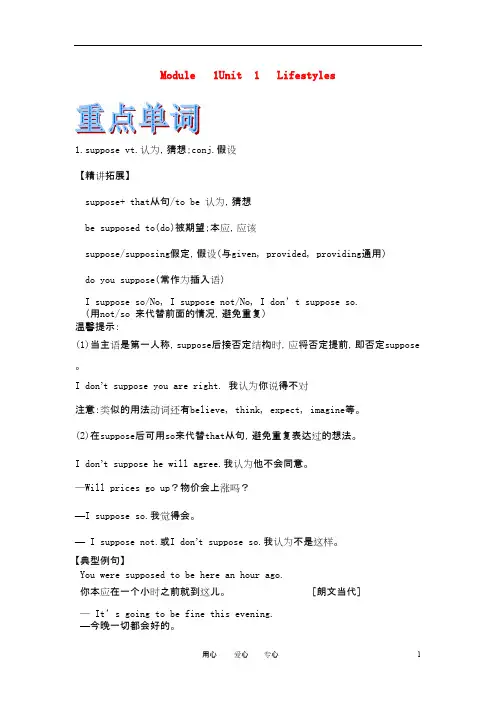
Module 1Unit 1 Lifestyles1.suppose vt.认为,猜想;conj.假设【精讲拓展】suppose+ that从句/to be 认为,猜想be supposed to(do)被期望;本应,应该suppose/supposing假定,假设(与given, provided, providing通用)do you suppose(常作为插入语)I suppose so/No, I suppose not/No, I don’t suppose so.(用not/so 来代替前面的情况,避免重复)温馨提示:(1)当主语是第一人称,suppose后接否定结构时,应将否定提前,即否定suppose 。
I don’t suppose you are right. 我认为你说得不对注意:类似的用法动词还有believe, think, expect, imagine等。
(2)在suppose后可用so来代替that从句,避免重复表达过的想法。
I don’t suppose he will agree.我认为他不会同意。
—Will prices go up?物价会上涨吗?—I suppose so.我觉得会。
— I suppose not.或I don’t suppose so.我认为不是这样。
【典型例句】You were supposed to be here an hour ago.你本应在一个小时之前就到这儿。
[朗文当代]— It’s going to be fine this evening.—今晚一切都会好的。
— I suppose so. —我想是的。
[朗文当代] Suppose it rains, what shall we do?假如下雨,我们怎么办?[朗文当代]It is widely supposed (that) the minister will be forced to resign.很多人都猜测首相会被迫辞职。
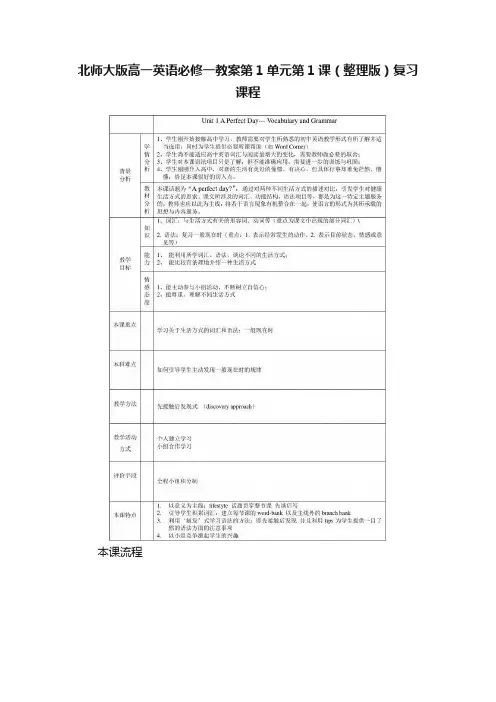
北师大版高一英语必修一教案第1单元第1课(整理版)复习课程本课流程Reading部分说课稿Unit one lifestylesLesson one a perfect day?第一个板块——教材分析※第一环节——说教材。
作为高中英语开篇单元,本单元的话题是lifestyles,主题与生活紧密贴切。
那么作为本单元的第一课A Perfect Day?其重要性不言而喻。
本课的知识点是大部分学生乐于学习和接受的,相信他们对本课的学习充满期待。
第二环节——说教学目标。
新英语课程标准指出,基础教育阶段英语课程的总体目标是培养学生的综合语言运用能力。
而综合语言运用能力又以学生语言技能、语言知识、情感态度、学习策略和文化意识五个方面的综合素养为基础。
1)Knowledge Objects2) a. To discuss favorite TV programs and daily activities3) b. To revise Present Simple and Present Continuous.4) c. To read two texts in order to check predictions.5) d. To read two texts for specific information.6)Ability Objects7) a. Enable the students to learn how to scan and skim.8) b. Enable the students to guess the meaning of the words from the context.9) c. Enable the students to understand the importance of reading.10)d. Enable the students to read a lot after class11)Emotion Objects12)a.To discuss the healthy lifestyles and improve the awareness of cross-culturalcommunication.13)b. Let the students know and respect different ways of lifestyles of people and let them knowhow to plan her/his future after reading the texts.在仔细研究教材和分析学生的心理和生理特点的基础上,我认为本课的重难点有:Teaching Important Points:1) Help the students to master the key words associated with lifestyles.2) Talk about people’s different lifestyles.3) Get the general idea about two passages.Teaching Difficult Points:1) How to grasp the key information of an article in the limited time.2) Train the students to use the third person in Present Simple to complete sentences correctly.3) Th e omit of “be” in Present Continuous.第二个板块——教学与学法分析。

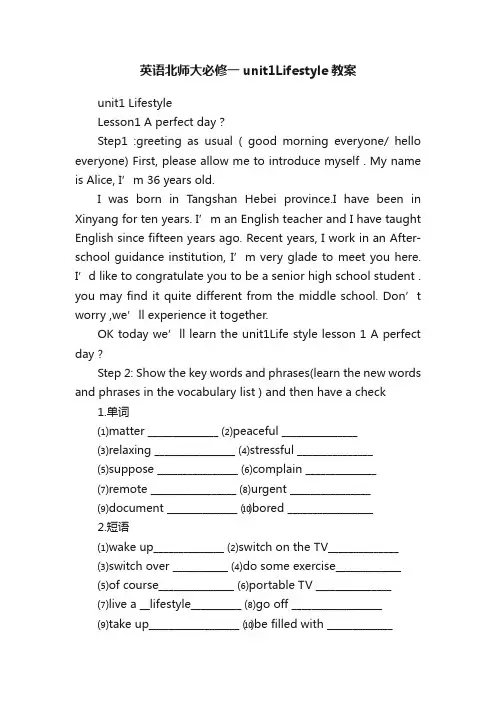
英语北师大必修一unit1Lifestyle教案unit1 LifestyleLesson1 A perfect day?Step1 :greeting as usual ( good morning everyone/ hello everyone) First, please allow me to introduce myself . My name is Alice, I’m 36 years old.I was born in Tangshan Hebei province.I have been in Xinyang for ten years. I’m an English teacher and I have taught English since fifteen years ago. Recent years, I work in an After-school guidance institution, I’m very glade to meet you here. I’d like to congratulate you to be a senior high school student . you may find it quite different from the middle school. Don’t worry ,we’ll experience it together.OK today we’ll learn the unit1Life style lesson 1 A perfect day ?Step 2: Show the key words and phrases(learn the new words and phrases in the vocabulary list ) and then have a check1.单词⑴matter ______________ ⑵peaceful _______________⑶relaxing ________________ ⑷stressful _______________⑸suppose ________________ ⑹complain ______________⑺remote _________________ ⑻urgent ________________⑼document ______________ ⑽bored _________________2.短语⑴wake up______________ ⑵switch on the TV______________⑶switch over ___________ ⑷do some exercise_____________⑸of course_______________ ⑹p ortable TV _______________⑺live a __lifestyle__________ ⑻go off __________________⑼take up__________________ ⑽be filled with _____________⑾complain about sth.___________ ⑿make money_____________ Step3. Read the passage and finish the following exercises1.Read for details about Brian Blakey’s day and fill in the form below.2.Read for details about Bob Black’s day and find out what he does in each period ?⑴Before the alarm clock goes off :___________________________⑵During the 15minutes after getting up :______________________________________________________⑶Morning and afternoon :________________________________________________________⑷Around 8:00 pm :_________________________________________⑸Around 10:00 pm:________________________________________⑹Midnight:_______________________________________________Step4. Language Points1. Then I get up, go downstairs and switch on the TV in the living room.然后起床,下楼,打开起居室的电视。
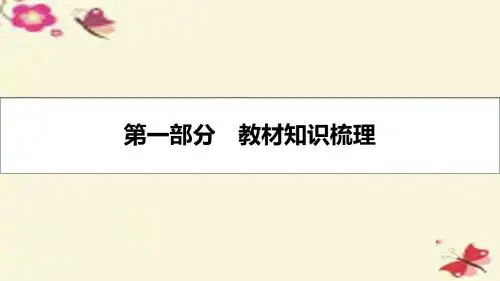
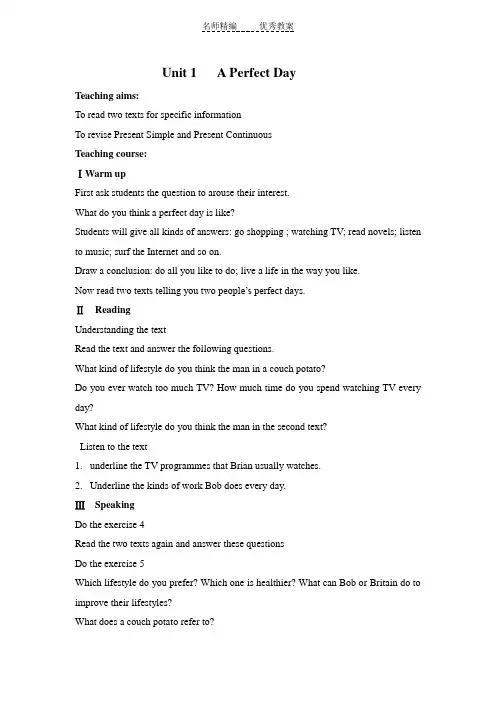
Unit 1 A Perfect DayTeaching aims:To read two texts for specific informationTo revise Present Simple and Present ContinuousTeaching course:ⅠWarm upFirst ask students the question to arouse their interest.What do you think a perfect day is like?Students will give all kinds of answers: go shopping ; watching TV; read novels; listen to music; surf the Internet and so on.Draw a conclusion: do all you like to do; live a life in the way you like.Now read two texts telling you two people’s perfect day s.ⅡReadingUnderstanding the textRead the text and answer the following questions.What kind of lifestyle do you think the man in a couch potato?Do you ever watch too much TV? How much time do you spend watching TV every day?What kind of lifestyle do you think the man in the second text?Listen to the text1.underline the TV programmes that Brian usually watches.2.Underline the kinds of work Bob does every day.ⅢSpeakingDo the exercise 4Read the two texts again and answer these questionsDo the exercise 5Which lifestyle do you prefer? Which one is healthier? What can Bob or Britain do to improve their lifestyles?What does a couch potato refer to?What does a workaholic mean?ⅣLanguage in useWork in pairs and describe your parents’ lifestyle t o your partner.ⅤVocabularyDo the exercise 7ⅥGrammarFirst turn to page 92 analysis and explain Present Simple and Present Continuous Then do the exercise 8 and 9ⅦHomeworkWrite a composition “My Perfect Day”Words:100 words or soSuppose you can design your a day freely what is your perfect day like?。
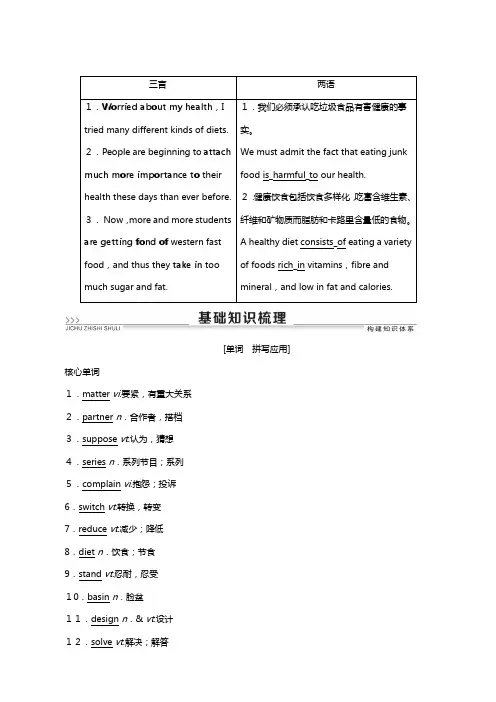
三言两语1.Worried about my health,Itried many different kinds of diets.2.People are beginning to attachmuch more importance to theirhealth these days than ever before.3.Now,more and more studentsare getting fond of western fastfood,and thus they take in toomuch sugar and fat.1.我们必须承认吃垃圾食品有害健康的事实。
We must admit the fact that eating junkfood is_harmful_to our health.2.健康饮食包括饮食多样化,吃富含维生素、纤维和矿物质而脂肪和卡路里含量低的食物。
A healthy diet consists_of eating a varietyof foods rich_in vitamins,fibre andmineral,and low in fat and calories.[单词拼写应用]核心单词1.matter vi.要紧,有重大关系2.partner n.合作者,搭档3.suppose vt.认为,猜想4.series n.系列节目;系列5.complain vi.抱怨;投诉6.switch vt.转换,转变7.reduce vt.减少;降低8.diet n.饮食;节食9.stand vt.忍耐,忍受10.basin n.脸盆11.design n.& vt.设计12.solve vt.解决;解答13.crowded adj.拥挤的[语境运用] 用所给词的适当形式填空。
1.It is not what you say but what you do that matters (matter).2.I can't believe my eyes.How can you stand being_treated (treat)like that?3.We asked him to assist us in designing (design)a new bridge.4.He switched (switch)from a back seat to a front one so that he could see clearly.5.My father is trying to_reduce (reduce)expenses because we don't have much money.6.The small classroom becomes very crowded (crowd)because over seventy students sit there.拓展单词1.peaceful adj.平静的;和平的→peace n.和平→peacefully adv.和平地;平静地2.relaxing adj.轻松的,放松的→relax vt.& vi.放松→relaxed adj.松懈的;放松的3.bored adj.厌烦的,不感兴趣的→boring adj.令人厌烦的;无聊的→bore vt.使厌烦4.distance n.距离→distant adj.遥远的5.formal adj.正式的,合礼仪的→informal adj.非正式的6.prefer vt.更喜欢;宁愿→preference n.喜好;偏爱7.volunteer n.志愿者vt.& vi.自愿去做→voluntary adj.自愿的;志愿的8.graduate vi.毕业n.毕业生→graduation n.毕业9.challenge n.挑战vt.向……挑战→challenging adj.有挑战性的10.advertisement n.广告→advertise v.做广告→advertiser n.登广告的人;广告商11.urge vt.催促;极力主张→urgently adv.急迫地,紧急地→urgency n.紧急;催促→urgent adj.急迫的,紧急的[语境运用] 用所给词的适当形式或所给提示填空。
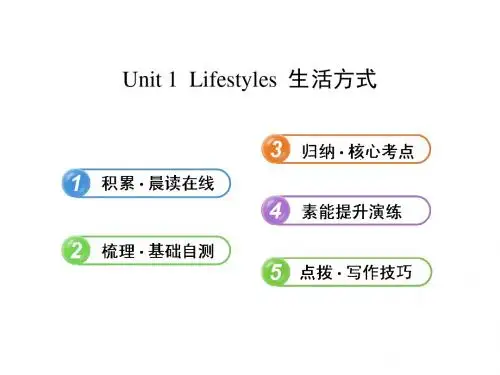
Unit 1 LifestylesⅠ.核心单词→识记·思考·运用一、单词拼写1.Within a few days she had become seriously ill,________ (遭受)great pain and discomfort.2.It is not what you say but what you do that ________ (要紧).3.(2015·安徽,完形)Changing our spending habits may be the best way to ________ (减少)the amount of rubbish.4.(2014·新课标全国Ⅱ,阅读B)Advanced lights,motors,and building ________(设计) have helped save a lot of energy and therefore prevented pollution.5.(2014·四川,阅读E ) After a week,the two groups ________(交换)with participants. 6.(2014·湖北,阅读E)Today,as the world's urban population explodes,and cities become more ________ (拥挤的).7.Many children ________ (宁愿) to play games on the computer rather than play outside.8.*I can't ________ (忍受) any more.I'm going to run away.9.I'm lucky that I'm interested in school work,________ (否则)I'd go mad. 10.*It's hard to ________ (预测) the result of the volleyball match.答案 1.suffering 2.matters 3.reduce 4.designs 5.switched 6.crowded 7.prefer 8.stand 9.otherwise 10.forecast二、用所给词的适当形式填空1.(2015·浙江,阅读B)The graph has a title,a main idea,and ________ (support)details.2.Most of these specialized schools are provided by voluntary ________(organize).3.*(2015·天津,阅读B) ________ (society) robots are not just making their way into the home.4.Massage is used to relax muscles,relieve ________(stressful) and improve the circulation.5.*After sixteen years of marriage they have grown ________ (bore) with each other. 6.(2013·重庆,写作一)On reading the mother's ________ (complain),I felt a little worried about the son's behaviour.7.They emphasised that their equipment was for ________ (peace) and not military purposes.8.Nowadays with the development of society,many ________ like to do ________ work in some distant areas.(volunteer)9.In a way,________ are good for developing our strong characters and I like doing ________ work.(challenge)10.________ (suppose) you win the lottery,what will you do with the money? 11.Generally speaking,we feel ________ while listening to some ________ music,for example,Small Apples.(relax)12.As a ________ who ________ from a key university,his brother was offered a satisfactory job after ________.(graduate)答案 1.supporting anizations 3.Social 4.stress 5.bored plaint 7.peaceful 8.volunteers;voluntary 9.challenges;challenging10.Suppose/Supposing 11.relaxed;relaxing 12.graduate;graduated;graduation 三、开心词场After graduating from college,Li Hua preferred to become a volunteer to work in the remote west.He said he was bored with the busy and crowded streets and couldn't stand the stressful lifestyle in big cities.He supposed that there were more challenges and chances in the distance.【联想·积累】❶学会“容忍”①bear vt. 忍受②stand vt. 忍受③tolerate vt. 忍受,容忍④put up with 忍受,容忍❷前缀为fore-的单词大全①forearm n.前臂②forefather n.祖先③forehead n.前额④foresee v.预料⑤foresight n.先见之明⑥foretell v.预言⑦forecast v.预测❸盘点以-ial为后缀的形容词①beneficial 有益的②commercial 商业的③facial 表面的④initial 最初的⑤special 特别的⑥social 社交的❹表示情绪的高频词汇①confident adj. 自信的②bored adj.无聊的;烦人的;无趣的③ashamed adj.羞愧的,惭愧的④depressed adj.沮丧的,意志消沉的⑤frustrated adj.失意的,挫败的;泄气的⑥confused adj.迷惑的,不解的❺词汇拓展①advertisement n.广告→advertise v.做广告→advertiser n.登广告的人②stressful adj.充满压力的,紧张的→stress n.压力→pressure n.压力(同义词)③urgent adj.急迫的,紧急的→urgency n.紧急;催促④distance n.距离→distant adj.遥远的⑤formal adj.正式的,合礼仪的→inform al adj.非正式的Ⅱ.重点短语→识记·思考·运用一、补全短语1.________ the moment 此刻,目前2.free ________ 免受;摆脱3.put pressure ________...给……施加压力4.be prepared ________...为……做好准备5.switch ________ 把开关打开6.take ________ to do sth 轮流做某事7.as well ________ 除……之外(还)8.switch ________ 转换频道答案 1.at 2.of/from 3.on 4.for 5.on 6.turns 7.as 8.over二、短语填空1.Move over,please; you are ____________ more than half the bench!2.Maria's mother isn't well.She often ____________ headaches.3.I forgot ____________ the lights after I left the room.4.What you have told me may ____________ to my own position.5.After ____________ I went out to buy what I wanted to buy most.6.I am glad to know I ____________ helping you get better.7.Several of the members have ____________ suggestions of their own.8.I am ____________ hearing from you in the near future.9.Being an explorer,Tom found that his life ____________ challenges and risks. 10.A bomb ____________ in the busy street and many people were badly hurt.答案 1.taking up 2.suffers from 3.switching off 4.make a difference 5.getting changed 6.played a part/role in e up with 8.looking forward to 9.was filled with 10.went off【联想·积累】❶“动词+off”短语荟萃①keep off 离开,远离②set off 出发③ring off 挂断电话④pay off 还清(债务)⑤switch off 关上⑥fall off 掉落⑦go off (爆竹、铃等)响❷小议“充满”短语①be full of②be crowded with③be filled with❸历数“get+过去分词”短语①get changed 换衣服,更衣②get dressed 穿好衣服③get hurt 受伤④get lost 迷路⑤get arrested 被捕⑥get promoted 升职⑦get drunk 喝醉Ⅲ.经典句式→识记·思考·运用1.*What kind of lifestyles do you think the men in the pictures have?(特殊疑问词+其他+do you think+陈述句)你认为图片中的人有着怎样的生活方式?[仿写]________________ is to blame for the present situation of Ukraine?你认为谁应该对乌克兰目前的局势负责?2.*I always take my portable TV and I sit on the stone wall while the dog walksround in a circle.(while表对比)我总是带着我的手提电视,我在石墙上坐着,而我的狗围着转圈。
Unit 1 LifestylesLesson 1 A Perfect Day?一、教学目标1.熟记并使用sports programs, TV series, cartoons, workaholic, couch potato, talk show, switch on/off/over, complain about等词语或词组。
知晓以下两条谚语:All play and no work makes Jack a mere boy. (尽玩耍,不学习,再聪明的孩子也没出息。
);All work and no play makes Jack a dull boy. (只工作,不玩耍,再聪明的孩子也变傻。
)2.学生通过文章标题解读和略读,泛听和细读,理清文章的脉络。
采用寻读,提取和概括课文的表层信息,并根据表层信息就深层次的生活方式进行比较、对照、判断和选择;以思维导图的方式,结合已学文本,通过小组活动呈现一种身边不健康的生活方式并予以批判。
学习文本后,模仿架构,能写类似的作文。
3.会尊重、理解不同的生活方式,学会规划自己的学习、生活,选择健康向上的生活方式。
二、重点难点教学重点:1. 熟记并使用sports programs, TV series, cartoons, workaholic, couch potato, talk show, switch on/off/over, complain about, go off等词语或词组;2. 阅读课文并能通过寻读理解课文大意;3. 通过对比,理解、判断workaholic, couch potato两种不健康的生活方式。
教学难点:1. 学生英语听力速记能力的培养;2. 学生总结、提取文本架构能力的培养;3. 学生的仿写能力的培养。
三、教学过程步骤1:Step1 WARM UP ----A surveyBesides study, what do you usually do for fun?1.Group discussion.Each group makes a survey to see the popularity of the TV programs. While talking, you can use the expressions offered.Are you fond of...? Are you keen on...?Do you like/love...? What are your feelings about...?Do you find any pleasure in...? I’m crazy/mad about...I adore... I really enjoy... I do like...type of programsportsnewsTV seriesdocumentary(纪录片)cartoon(动画片)total numbertype of programgame show(游戏节目)filmtalk showentertainment(娱乐节目)total number2.Check the result of the survey by letting one or two students talk about their favorite TVprograms. 步骤2:Step 2 READING1.Before reading, remind the students of the title of the text: Why is there a question mark with the title?2.Brief introduction to Brian Blakey and Bob Black.3.Listening Practice.Task1.While listening to Part1, Ss take down in shorthand the TV programs that Brian usually watches.Task 2.While listening to Part2, Ss take down in shorthand the kinds of work Bob does every day.4.Ss read the text and answer the following questions:1) Is Brian a lazy person? Can you find 2 examples of his lazy behavior?(Yes, Brian is lazy. For example, h e watches the children’s programs until about half-past ten. Then he gets up. He doesn’t work but his wife works and she makes his meals.)2)Why does Bob work so hard?(He wants to make more money. Besides, he gets bored if there is nothing to do . He likes being busy.)3)How did the author organize the text?(In the order of time and place.)4)Conclude the general idea of each paragraph.A couch potatoPara1:Addiction to TV programs all day long.Para2:Do some exercise---walk dog with portable TV.Para3:A helping wife. Not much money, but happy. World in hand. Great!A workaholicPara1:Rush to workPara2:Urgent work all day longPara3:Still work after workPara4:Not enough time for fun and family, but for money. Like being busy.5)What do the couch potato and the workaholic have in common?(They all lead an unhealthy way of life, Brian watches TV all day long without doing nothing else, while Bob works almost around the clock to make more money for his family without enough rest.)6)Compare these two lifestyles.A couch potato → All play and no work makes Jack a mere boy.A workaholic →All work and no play makes Jack a dull boy.Conclusion: We make a conclusion that we should lead a balanced life. We should try to alternate work with rest and recreation. So, the author shows his attitude that he is not for these two unhealthy lifestyles by putting a question mark with the title.7)Can you find a same lifestyle that your friend is now leading?(①a phubber;②a studyaholic)步骤3:Step3 COMPOSITION FRAMEWORKStructure of the text描述……的一天(时间、地点、做何事);概述……的喜恶;综述……的生活给家人的感受。
续写语料积累背诵·句之美欣赏·语之秀1.(行为描写)(2022·新高考卷Ⅰ)However,he went all out tokeep up with the others,hissmall body rocking from side toside,showing no sign of givingup.2.(品格描写)(2020·新高考卷Ⅰ)Mrs.Meredith was a most kindand thoughtful woman.(2022·新高考卷Ⅰ)Hearing mywords,he beamed a big smile,stoodup and moved towards the startingline.Looking at his determinedface,I was touched.When the runbegan,every runner rushed forwardlike a flash after hearing the startingpistol.核心单词语境运用(用所给词的适当形式填空)1.senior adj.较高的,高级的petence n.能力,胜任3.recover v i.恢复健康,康复4.arise v i.(问题或困难)出现,发生5.definitely ad v.确切地,肯定地6.convenient adj.方便的,便利的7.actually ad v.实际上,事实上8.remove v t.移走;去掉1.Our junior employees are being trained for more senior(senior) roles.2.Several difficulties arose(arise) when we began to work on the new design.3.Can you telephone me at your convenience(convenient) to arrange a meeting?4.The form lists the knowledge and competences(competence) required at thisuntil seven o'clock in the evening.1range[课本义]n.一系列;范围[增补义]v.排列;涉及;在一定的范围内变动/变化①When setting my foot on the dynamic campus,I know I will face a range of challenges.②When driving on highways,the driver must control his or her speed within/in the range of speedlimiting.Besides,I have a wide range of (广泛的)hobbies,which range from playing the guitar to swimming(从弹吉他到游泳).◎a range of一系列……beyond/out of one's range超出某人的范围in/within the range of在……范围之内◎range from A to B/between A and B在A到B之间变化find a house in our price range找到在我们的价格范围以内的房子be now out of her range of vision走出了她的视线2convenient adj.方便的,便利的①Students think it is convenient for them to communicate with the outside world by using cell phones.②I hope you can send me an answer at your convenience (convenient).方便的时候,你可以去参观一些你最喜爱的博物馆。
北师大版高一英语必修一Unit( 1)Lifestyles教学案第一单元 Lifestyles【话题导入】People from All Walks of LifeWhenpeople grow up, they will take different occupations in different work places. A society is thus made up of people from different walks oflife. What kind of person do you want to be in the future? Thefollowing introductions might help you to make a right decision.TeacherTeachers are professionals who work in schools, colleges anduniversities. They try their best to help their students get new knowledge and becomeuseful people in the future. Teachers work includes explaining lessons, giving homework and correcting papers and so on. At the end ofevery term, they give grades to their students, too. Actually teachersdo more. Often their impact on students stays all through their lives.DoctorDoctors, like teachers, are also professionals. They work inhospitals. Doctors are usually very busy too. They examine patients then tell them what kind of medicine to take. The skills of a doctor sometimes mean the difference between life and death.SecretaryA secretary is a person who writes letters, answers the telephone,and receives people. She stores information in a computer and keepdocuments in order. A secretary stands between her boss and the visitors;she also helps the boss to plan his time and finishes his work. Girls are more likely to become secretaries then boys.BusinesspersonA businessman usually works in an office, where he/she also goes tomeetings and discussed problems with his/her business partners. He/Sheworks at buying, selling, and producing things, He/She usually does notwork by himself/herself, but hire workers to help him/her. People often thinka businessperson gets rich quickly, but, in fact, for every coin,they have spent a lot of time and efforts。
Unit 1 LifestyleLesson 3 A volunteer teacher辅导与练习一般将来时也译为单纯将来时。
例A:I shall not come if it rains tomorrow.(如明天下雨我就不来。
)例B:My brother will leave for the United States next week.(我的哥哥下星期要到美国去。
)解说从句式我们可以了解一般将来时的表达须借助于助动词“shall/will”。
关于“shall/will”的用法,传统文法谈得很多,同时各文法学家的理论也不很一致。
更重要的是英国人和美国人对“shall/will”的用法规则并不很一致,也不很严谨,所以本书拟只提供下面的五个规则,相信各位只要把下面这五个规则学通了,你的“shall/will”的用法就可以中规中矩了。
①说或写都尽量使用“I'll, You'll, He'll , She'll , It'll, We'll , They'll …”的简缩形(如用法例2、3)。
②要表达主语的“意志”,通常都用“will”(文法上称为意志将来。
)例A:I won't see him again.(我不愿意再和他见面。
)例B:Who will go and help that poor old man?(谁愿意去帮助那个可怜的老人?)Mary will . (玛莉愿意。
)③说话者要把自己的“意志”表达或行使出去,通常用“shall”。
例A:You shall not do that again.(你不可以再做那样的事。
)例B:He shall return that book tomorrow.(明天他必须把那本书归还。
)④第一人称问句使用“shall”。
例A:Shall I call you a taxi ?(需要我替你叫一辆出租车吗?)例B:Shall we tell her the truth ?(我们可以把实情告诉她吗?)⑤问句是“Shall…?”,答句就用“shall ~”;问句用“Will …?”,答句就用“will ~ ”。
英语:Unit1《Lifestyles》学案(北师大版必修1)Ⅰ学习目标单词Warm -upboring, relaxing, stressful, peaceful, active, interesting, dangerous, exciting Lesson 1sports programmes, TV series, cartoons, game showsLesson 2stress, studio, expert, pressure, social, reduce, organise, prefer, stand Lesson 3support, solve, design, volunteer, challenge, advertisement, presentation Lesson 4accountant, crowded, career, otherwise, nearbyCommunication Workshopclassical, formal, style, cycle短语Warm-uponce a week, in one's free timeLesson 1switch on/off/over, go off, take up, be filled with, complain aboutLesson 2suffer fromLesson 3graduate from, be excited about, make a decision, be prepared for, meet challenges, to tell the truth, have a long talk, win one's support, be proud of, solve problemsLesson 4distance learning, music fan, weather forecastCommunication Workshopat the moment, over the years句型I think... but...I find... very...I prefer/like/enjoy... because...I can't stand...交际用语All the best.Can you give me...?How about...? Why don't you...?语法一般现在时和现在进行时一般将来时will,be going to及一般现在时表示将来Ⅱ质量检测形成性检测一、词组互译A.英译汉:1.once a week ________________ 2.graduate from________________ 3.meet challenges ________________ 4.win one's support________________5.solve problems ________________ 6.complain about________________7.make a decision ________________ 8.to tell the truth________________9.be proud of ________________ 10.be prepared for________________B.汉译英:1.转换频道,转变________________ 2.忍受,遭受________________3.数年间________________ 4.占据________________5.把……关上________________ 6.充满着________________7.此刻、目前________________ 8.(爆竹、铃等)响________________9.终日懒散在家的人________________ 10.把……打开、接通________________二、用括号里词语的适当形式填空1.He really can't stand the ________ speech. (tire)2.At last, they ________ the problem successfully. (solve)3.She finds her new teaching job very ________ (stress)4.A group of ________ are studying on the damage caused by the earthquake. (expert) 5.Every student is eager to have a ________ holiday. (relax)6.Before Christmas, the supermarket was ________ with shoppers. (crowd)7.We can see the mountain from the ________ (distant)8.Finally, she made the ________ to study abroad. (decide)9.Li Ming is lucky enough to become one of the ________ for Beijing Olympic Games. (volunteer) 10.What is your plan for the ________ weekend?(come)三、单项选择1.— Hi, Lily. I've read your latest book. It's really wonderful!— I'm glad you like it.—What's your new plan?—I ________ another book about animals next month.A.am going to write B.wroteC.am writing D.have written2.—I think being a basketball player is really exciting.—Yes, ________ sometimes it is very________.A.but... interesting B.and... interestedC.and... stressful D.but... stressful3.Having a wonderful holiday can make people________.A.relaxing B.to be relaxed C.relaxed D.to relax4.Mary always ________ to me ________ her roommate.A.complained... about B.complained... toC.complains... about D.complains... to5.—By the way, what's the time now?— Half past nine.—Please get everything ready. Mr. Black ________ at any time.A.has arrived B.is arriving C.arrive D.arrived6.When his parents came back home, they found ________ reading the book carefully.A.he B.his C.him D.himself7.—How ________ you ________ on with your classmates now?—Quite well.A.will...get B.do... get C.did... get D.are... getting8.—What's Tom's hobby?—Tom, as well as his brothers, ________ making models very much.A.likes B.like C.is liking D.are liking9.—I haven't seen Mr. Lee for a long time. What's he doing?—He is busy preparing for the coming test________.A.in a moment B.at the moment C.for the moment D.for a moment10.I ________ the dictation when you ________ ready.A.will begin, were B.begin, wereC.will begin, are D.begin, are11.He is in poor health and he suffers ________ from it.A.a few B.many C.a little D.a lot12.—Did you attend the speech?—Yes, but I was ________ by the ________ speech.A.boring, boring B.bored, boring C.boring, bored D.bored, bored13.—Where is Mrs. White?—She ________ and left five minutes ago.A.gets dressed B.puts on C.got dressed D.put on14.—What do you think of your English study?— It's OK, but sometimes ________ difficult for me to keep up with the others in my class. A.that is B.this is C.one is D.it is15.Mr. White ________ a job as an engineer twenty years ago.A.took on B.took down C.took off D.took up四、完形填空Man has a big brain. He can 1 , learn and speak. Scientists used to think that men are 2 from animals because they can think and learn. They know now that animals can learn—dogs, rats, birds—and worms—can learn. So scientists are 3 to understand that men are different from animals because they can 4 Animals cannot speak. They make 5 when they are afraid, or angry, or unhappy. Apes (猿) are our nearest 6 They can understand some things more quickly than human beings, and one or two have learned a few 7 But they are 8 different from us. They cannot join words and 9 sentences. They cannot think like us because they have no language. They can never think about the past or the 10 Language is a wonderful thing. Man has been able to develop civilization ( 文明) because he has language. Every 11 can speak his own language very 12 when he is four or five—but 13 animal learns to speak. How do children learn?Scientists do not really know. What happens when we speak? Scientists do not know. They 14 know that man can speak because he has a big 15 .1.A.think B.act C.move D.see2.A.away B.separated C.free D.different3.A.trying B.beginning C.intending D.getting4.A.speak B.tell C.say D.talk5.A.voice B.cry C.a whistle D.a noise6.A.humans B.brothers C.cousins D.friends7.A.things B.numbers C.skills D.letters8.A.already B.yet C.still D.quite9.A.invent B.tell C.find D.make10.A.future B.surroundings C.enemies D.dangers11.A.person B.boy C.girl D.child12.A.wonderful B.well C.clearly D.beautifully13.A.no B.few C.such D.seldom14.A.really B.only C.usually D.actually15.A.head B.brain C.body D.luck五、阅读理解AOn June 17, 1774, the officials from Maryland and Virginia held a talk with the Indians of the Six Nations. The Indians were invited to send boys to William and Mary College. In a letter the next day they refused the offer as follows:We know that you have a high opinion of the kind of learning taught in your colleges, and that the costs of living of our young men, while with you, would be very expensive to you. We are convinced that you mean to do us good by your proposal (提议, 建议); and we thank you heartily. But you must know that different nations have different ways of looking at things, and you will therefore not be offended if our ideas of this kind of education happen not to be the same as yours. We have had some experience of it. Several of our young people were formerly brought up at the college of the northern provinces: they were taught all your sciences; but when they came back to us, they were bad manners, ignorant (无知的, 愚昧的) of every means of living in the woods — they were totally good for nothing.We are, however, not the less obliged (使感激) by your kind offer, though we refuse to accept it; and, to show our grateful sense of it, if the gentlemen of Virginia will send us a dozen of their sons, we will take care of their education, teach them all we know, and make men of them. 1.The passage is about________.A.the talk between the Indians and the officialsB.the colleges of the northern provincesC.the educational values of the IndiansD.the problems of the Americans in the mid -eighteen century2.The Indian chief' s purpose of writing the letter seems to be to________.A.politely refuse a friendly offerB.express their opinions on equal treatmentC.show their prideD.describe Indian customs3.According to the letter, the Indians believed that________.A.it would be better for their boys to receive some schoolingB.they were being insulted (侮辱, 辱骂) by the offerC.they knew more about science than the officialsD.they had better way of educating young men4.Different from the officials' view of education, the Indians thought________.A.young women should also be educatedB.they had different goals of educationC.they taught different branches of scienceD.they should teach the sons of the officials firstB阅读短文,根据要求回答问题。
● ⎪⎪第一部分教材复习必修1 ●[话题素材]好词1.diligent adj . 勤奋的→lazy (反义词) adj . 懒惰的2.positive adj . 积极乐观的→negative (反义词)消极的3.hobby n . 业余爱好4.passion n . 激情5.hard-working adj . 努力工作的6.happiness n . 幸福7.be used/accustomed to 习惯于……8.be crazy about 对……着迷9.achieve/realize one's dream 实现某人的梦想10.manage to_do sth. 设法做成某事11.be full of 充满12.take one's advice 接受某人的劝告13.appreciate/value one's friendship 珍视……的友谊14.stick to 坚持15.be satisfied with 对……满意佳句1.You have to keep moving towards where you want to be no matter what is in front of you. 你要向目标迈进,不管横在你前面的是什么。
2.Let go of what you can; the_less negative, the_more room there is to be happy.能放手就放手;负面因素越少,开心的空间就越大。
,[精美语篇]The happiest people don't necessarily have the best of everything; they just make the most of everything that comes along their way. Happiness belongs to those who cry, those who hurt, those who have searched, and those who have tried, for only they can appreciate the importance of people who have touched their lives. Love begins with a smile; grows with a kiss and ends with a tear . The brightest future will always be based on a forgotten past, you go on well in life until you let go of your past failures and heartaches.高频单词1.matter (v i.) 要紧,重要;有重大关系(n.) 物质,问题;毛病2.relaxing (adj.) 轻松的,放松的→relax (v t.&v i.) 放松→relaxed (adj.) 松懈的;放松的3.stressful (adj.) 充满压力的,紧张的→stress (n.) 压力→pressure (n.) 压力(同义词) 4.suppose (v t.) 认为,猜想,假定,假设→supposing (conj.) 假设,假定5.switch (v t.) 转换,转变(n.) 开关6.urgent (adj.) 急迫的,紧急的→urgency (n.) 紧急;催促7.bored (adj.) 厌烦的,不感兴趣的→boring (adj.) 令人厌烦的;无聊的→boredom (n.) 厌烦;无聊8.suffer (v i.) 遭受(痛苦),感到疼痛→suffering (n.) 苦难;受苦9.reduce (v t. & v i.) 减少,降低,缩小→decrease (同义词)(v t.&v i.)减少,缩减→increase (反义词)(v t.&v i.) 增加10.organise (v t.) 组织→organisation (n.) 组织→organiser (n.) 组织者→organ (n.) 器官;机构11.prefer (v t.) 更喜欢;宁愿→preference (n.) 喜好;偏爱12.challenge (n.) 挑战→challenging (adj.) 挑战性的;考验能力的13.support (v t. & n.) 支持;支撑→supporter (n.) 支持者;拥护者→supportive (adj.) 给予帮助的;支持的;鼓励的14.design (n.&v t.) 设计→designer (n.) 设计者15.otherwise (ad v.) 否则;另外16.graduate (v i.&n.) 毕业;毕业生→graduation (n.) 毕业重点短语1.look_forward_to盼望,期望2.make_a_difference 有影响;重要;起作用3.play_a_role/part_in 在……中起作用4.suffer_from 忍受,遭受5.make_sure 弄清,查明6.go_off (铃、爆竹等)响7.take_up 占据8.at_the_moment 此刻,目前9.switch_over 转换频道,转变10.come_up_with 想出(计划、办法等)热点句型1.do you think用作插入语What kind of lifestyle do_you_think the people have?(教材P7)你认为这些人有什么样的生活方式?2.不定式短语作后置定语I am always the first person to_get_to_the_office.(教材P9)我总是第一个到达办公室的人。
3.find+宾语+宾语补足语I find painting or drawing very_relaxing.(教材P10)我发现画画让人很放松。
4.so...that...引导结果状语从句Usually, it's so crowded that I can't find anywhere to sit.(教材P14)通常地铁很拥挤,我很难找到座位。
5.the same... that...句型We don't have the_same work hours that office workers in the city have.(教材P15)我们和这个城市里在办公室工作的人的上班时间不同。
教材复现在空白处填入适当的内容(1个单词)或括号内单词的正确形式。
1.I watch more films and I usually switch ________ the TV at about two o'clock.答案:off2.I sit on the stone wall ________ the dog walks round in a circle.答案:while3.I couldn't live this lifestyle ________ a good wife.答案:without4.The mornings are always very busy and the afternoons are even ________!答案:busier5.Every minute of the day is filled ________ urgent matters.答案:with6.I work for a French company so I think ________ (study) French will help me in my job.答案:studying7.We like to go walking ________ there are no shops, crowds or the tube.答案:where8.Right now I am studying Chinese by ________ (distant) learning.答案:distance9.________ (fortunate), my wife isn't as fond of them as I am.答案:Unfortunately10.This meal ________ (include) cakes and sandwiches, and tea was served to wash down the food.答案:included1matter vi.要紧;重要;有重大关系n.物质;问题;毛病As long as I get good marks in my texts, it doesn't matter if I can speak English or not.(P4)只要考试得高分,我会不会说英语就无关紧要了。
(1)as a matter of fact 事实上;实际上a matter of 一个……的问题to make matters worse 使情况更糟的是=what's worseno matter+疑问词=疑问词+ever 无论;不管What's the matter with...?……怎么了?(2)It doesn't matter. 没关系。
What matters is... 重要的是……It matters/doesn't matter to sb.+主语从句(对某人来说)有关系/没关系;重要/不重要①[牛津大词典]Does it really matter who did it?是谁干的真的很重要吗?②[2014·江苏高考]Sweet Maya, it_doesn't_matter wha t you “become” later on.亲爱的玛雅,以后你成长为什么样的人并不重要。
③[2013·山东高考]And to_make_matters_worse/what's worse, its new owner had no plans to give it the funds it required.让事情更糟的是,它的新主人对需要给予的资金没有任何计划。
易混辨析matter 通常指客观存在的或有待处理的问题,常用于“a matter of”结构中affair 可用于描述严肃认真的公共或政治“事务”,如:foreign affairs 外交事务;也可描述与个人生活密切相关的“小事”event 通常指“重大事件”、“大事”;亦可指体育赛事中的“项目”三者都有“事情”之意a.The election was the main ________ of 2010.b.We are friends, but I don't know much about their private ________.c.We have several important ________ to deal with at our next meeting.答案:a.event b.affairs c.matters2suppose vt.认为,猜想;假设Mmm and my life is very stressful, I suppose.(P7)嗯,我想我的生活很有压力。